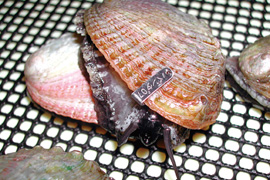The Mitsui & Co. Environment Fund
Introduction to Grant Projects
Fisheries-Maritime-Area Collaboration Division, Tokyo University of Marine Science and Technology Visiting Professor Hiroshi Yamakawa
Research on resource management methods to sustain/increase abalone resources through a configuration of a marine product traceability system
Research grant
- Project Description
Japanese abalone command very good prices on international markets. However, because of deterioration and other changes in habitat as a result of coastal economic activity, seawater warming or the like, they remain in gradual retreat. Attempts to maintain/restore abalone stocks through seedling releases and the like, while ongoing, have not been sufficiently effective. In this research, we seek to establish a suitable and effective method of managing abalone resources by applying traceability techniques to resource surveys, to studies of poaching/harvesting regulations, and to other such initiatives. As specific measures toward this goal, we are to:
(1)tag abalone seedlings; conduct catch surveys;
(2)establish a method of characteristic analysis for resource structures
(3)construct a mathematical/statistical model for practical application to resource estimation
(4)provide concrete proposals/operating standards to optimize seedling releases and regulate harvests;
(5)quantify (estimate) losses to poaching and, by extension, appropriately control/manage economically valuable abalone resources (by, as above, optimizing seedling releases, proposing concrete measures for harvesting, etc.).
Surveys sites are: the Hegurajima fishing grounds off Wajima, Ishikawa Prefecture (said grounds being notable for a marked decline in fisheries resources in recent years); the Kuzaki fishing grounds off Toba, Mie Prefecture (said grounds being notable for a zoning system introduced many years ago); and waters off Utatsu, Minami Sanriku-cho, Miyagi Prefecture and off Kominato, Katsuura, Chiba Prefecture (said waters notable as sites at which we earlier conducted traceability studies and continue to produce catches that include tagged abalone).
- Fields
- Marine resources/foodPreservation of biodiversity and ecosystem
- Grant year
- FY2007 Research Grants
- Grant term
- 3 years
April 2008 - March 2011
- Grant amount
- 7,055,444 yen
- Activity region
- Miyagi, Mie, Ishikawa, and Chiba Prefectures

Overview of the Organization

- Representative
- Visiting Professor Hiroshi Yamakawa
- Profile
- Specialist field
Life histories and reproductive ecologies of shallow-sea fisheries resources
Affiliated academic societies
Japanese Society of Fisheries Science; Ecological Society of Japan; Japanese Society for Aquaculture Science; Japanese Society of Fisheries Engineering; Japanese Society of Fisheries Oceanography; Sessile Organisms Society of Japan; Malacological Society of Japan
Background
In March 1968 graduated from the Department of Aquaculture at Tokyo University of Fisheries, and in 1989 completed a Ph.D. in agriculture (University of Tokyo) - WEB site
- http://olcr.kaiyodai.ac.jp/
- Collaborating researchers
- Kazumi SAKURAMOTO, Professor, Department of Ocean Science and Technology, Tokyo University of Marine Science and Technology; Naoki SUZUKI, Assistant Professor, same
- Research record
-
- (1) Hiroshi YAMAKAWA. "Proposal of method of abalone release shell tagging to facilitate resource management and discourage poaching." Gekkan Gyoson, Gyoson Bunka Kyokai, January 2004.
- (2) Hiroshi YAMAKAWA. "Abalone information management with stainless steel and IC tags." Brain Techno News No. 113 pp. 32-37. Bio-oriented Technology Research Advancement Institution, National Agriculture and Food Research Organization. 2005
- (3) Hiroshi YAMAKAWA. "Introductions of anti-poaching methods." Conference Proceedings of the Japanese Society of Fisheries Engineering, Vol. 2005: 213-216. Japanese Society of Fisheries Engineering. 2005.
- (4) Hiroshi YAMAKAWA et al. (2007). "Development of traceability tags for abalone and other shellfish; and application to resource management." Summary of proceedings of the spring 2007 conference of the Japanese Society of Fisheries Science, No. 1312. Japanese Society of Fisheries Science, 2007.
- (5) "The world moves, Japan moves—application of tagging within abalone distribution networks." White Paper on the Oceans and Ocean Policy 2007. Ocean Policy Research Institute.
- (6) Hiroshi YAMAKAWA. "The abalone industry: current state, challenges." Gekkan Gyoson, June-September. Gyoson Bunka Kyokai, 2004.
- (7) Hiroshi YAMAKAWA. "Development of traceability tags for attachment to shellfish." Gekkan Yoshoku. Midori Shobo, 2008.
- (8) Hiroshi YAMAKAWA. "Rapid advance of abalone cultivation in South Korea." AquaNet Monthly Sobunsha, 2008.